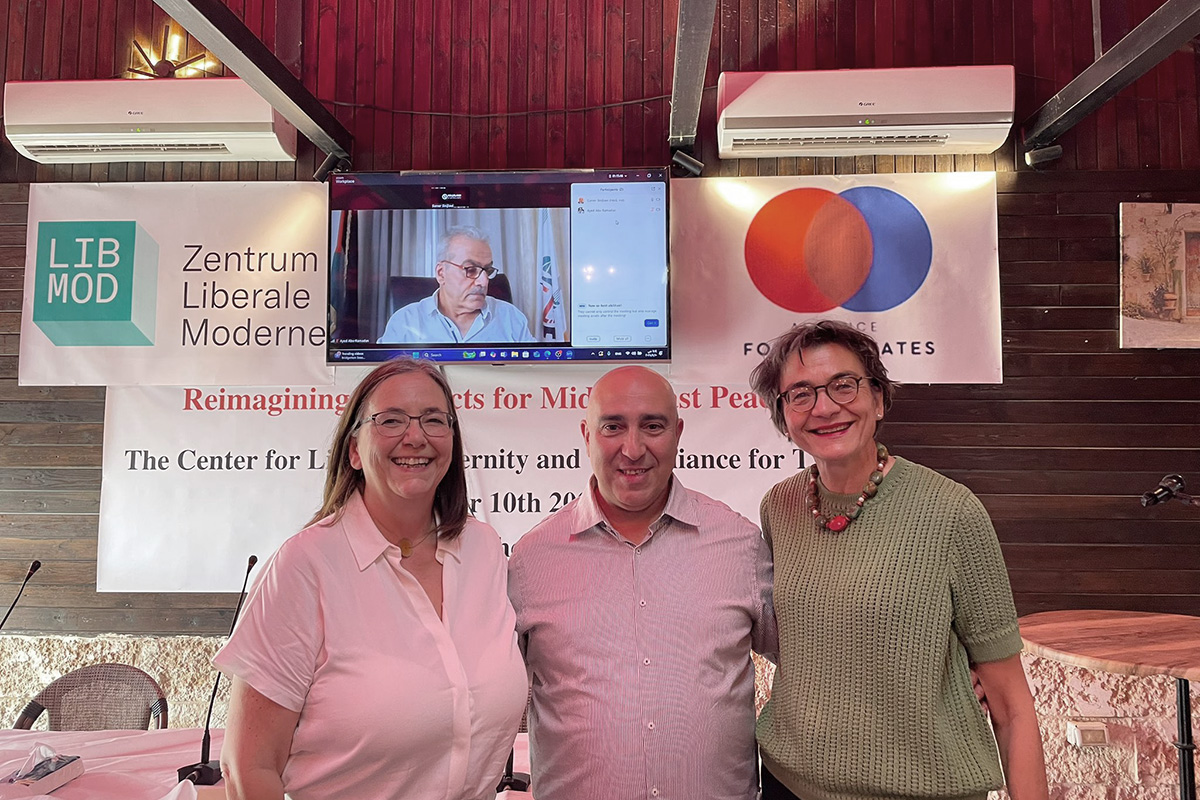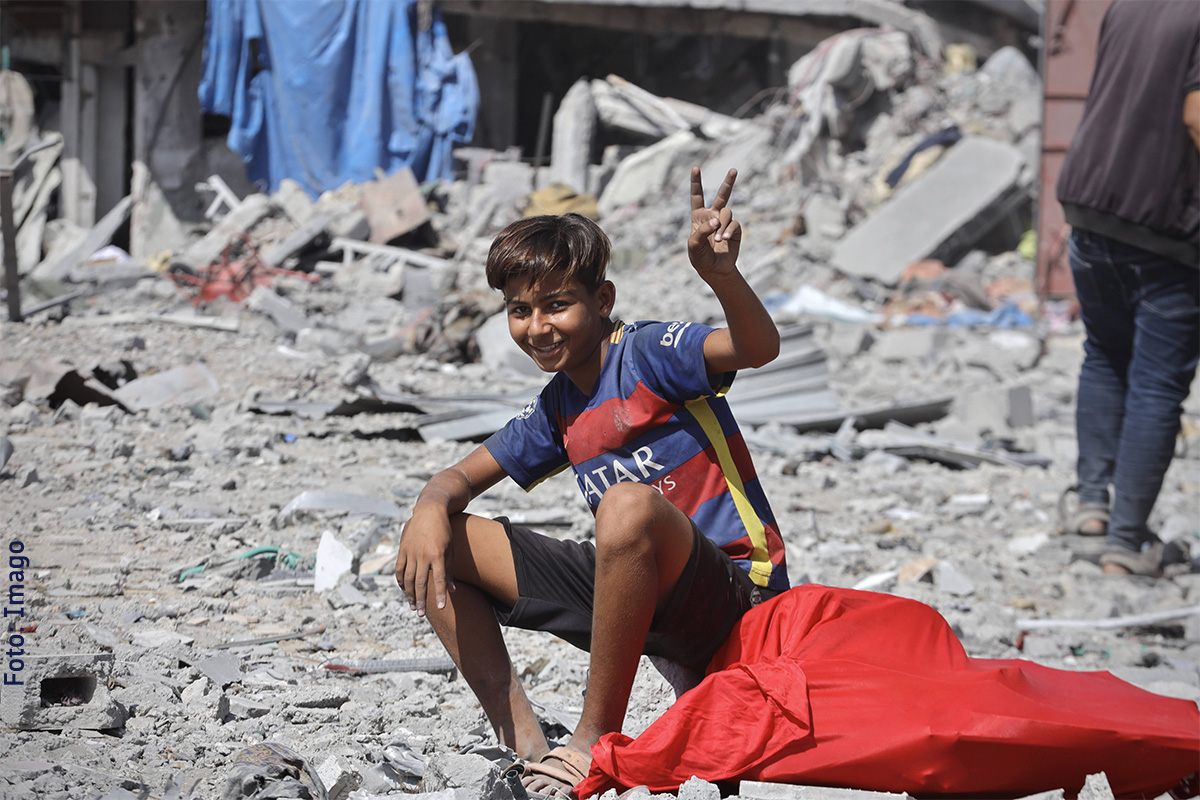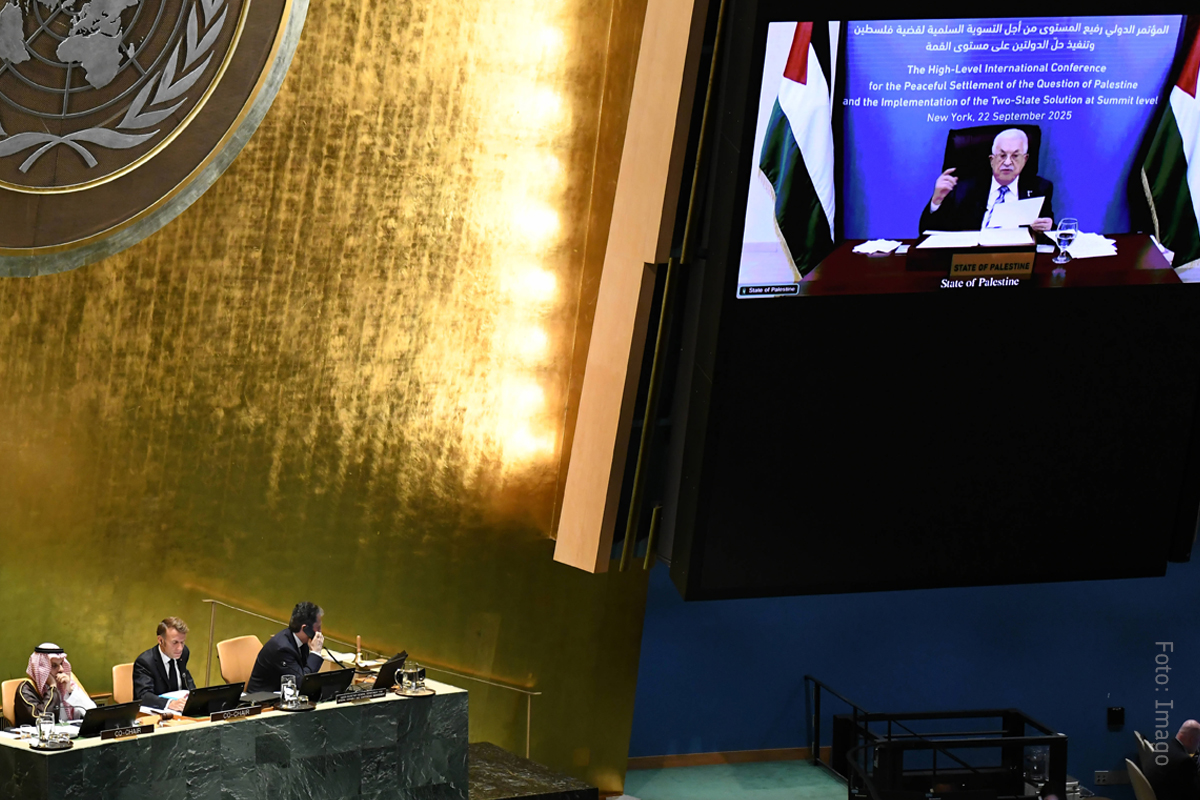Israel and Hamas: “An ideology cannot be destroyed by force of arms”

Gershon Baskin is one of the leading voices on the Middle East peace process and one of the few Israelis with direct contact to Hamas. For almost two decades, he was in contact with Ghazi Hamad, one of organisation’s senior political leaders. In this interview, Baskin provides insights into Hamas’ ideology, its often presumed willingness to sign ceasefire agreements and into ways to combat the organization’s cult of death.
Mr Baskin, how did you experience the moment when you heard about the atrocities of October 7?
At the time, I was on a vacation trip to Copenhagen with my wife. In the beginning, we had no idea of the dimension of the horror, but it was still clear that something completely different was going on here than we had seen and experienced before. We were extremely shocked, not only because it became clear that Hamas was acting according to the rule book of ISIS. But also because Israel’s defense had clearly failed. We could hardly believe how easy it was to cross the border on October 7.
Back in Israel, I immediately wanted to find out if there was a way to negotiate the release of the hostages. I contacted people in Hamas and got in touch with someone who knew the numbers of underage and female Palestinian prisoners in Israel. My thought was: the first thing we need to do is to find out whether a humanitarian release of women, children and elderly people from the hands of Hamas is possible. I had the impression that the sooner we could do that, the easier it would be to deal with the bigger crisis afterwards.
For almost twenty years, you have been in regular contact with members and high-ranking officials of Hamas, especially with the organization‘s mouthpiece Ghazi Hamad. How has your communication developed since the atrocities of October 7?
Ghazi Hamad’s first reaction to my contact was to deny the brutal acts of terror. I then confronted him with the fact that there were photos and footage showing the killing of babies and the burning of entire families. On the fifth or sixth night of the war, I had a half-hour phone conversation with someone in Gaza who is one of the founders of Hamas. He didn’t deny what had happened, but he said: “What do you expect from us? We are tired of living the way we do. We are tired of being humiliated, of living under occupation, of being locked in a cage. We are no longer prepared to accept that.”
This sounds very similar to what you hear a lot these days in Europe and in the US from Islamists as well as from many left-wing progressives: the atrocities of October 7 are relativized or even justified by placing the unprecedented massacre in a very general and vague context of the oppression of Palestinians.
In fact, that is exactly what my interlocutor did. At the end of the phone call, he then tried to get out of the affair by categorically separating Jews and Zionists. He had always believed that Muslims, Christians and Jews could live together in peace in one state, he said. But that would not be possible with “these Zionists.” Israel was an “evil state” per se, which had no right to exist and therefore “had to go.” We are familiar with this way of arguing from other contexts, too. But nowhere in the world is there a justification for a massacre like the one on October 7.
How did your communication with Ghazi Hamad continue?
After I heard that Israel had bombed Ghazi Hamad’s house, I got in touch with him again. I wanted to work on a deal to release children and the elderly from the hands of Hamas in exchange for female and underage prisoners from Israeli jails. Hamad said he would talk to the Hamas leadership and see if they could move this forward.
When I confronted him again with the atrocities and made it clear that Hamas had crossed a line on October 7 and that its fate was now sealed, he replied excitedly and angrily: Hamas was strong and still had many deadly surprises in store. In any case, they were not at all afraid to die. This was a completely different Gazi Hamad compared to the one I had gotten to know over the years. I had never had any illusions about the ideology of Hamas. But over the years I had gained the impression that it was possible to negotiate a so-called hudna, a long-term ceasefire.
You have now cut off your communication with Ghazi Hamad. Why?
Shortly after my last direct contact with him, I found out through an informant that he was not in Gaza, but in Beirut, although he was acting as a Hamas spokesman in the war with Israel. There he also gave his terrible interview to a TV station. In it, Hamad justified the atrocities and said that Hamas would do the acts of October 7 again and again until Israel – as a supposedly illegitimate state with no right to exist – is destroyed.
I then made it clear to him in a letter that after eighteen years, over a thousand conversations and four face-to-face meetings, our communication has now come to an end. I wrote to him that he had lost his humanity and was a coward. I then published the letter on Twitter. If it would help save people’s lives, I would communicate with him again. But I am convinced that he no longer has anything to do with the decision-making in Gaza. That’s where the decisions regarding the Israeli hostages must be made.
The international community, the United States and Israel, appear to be placing the weight of the negotiations on Qatar.
I am very skeptical that the high-ranking Hamas officials sitting in their five-star luxury hotels in Doha with bodyguards provided by the Qatari government have anything to do with the negotiations with the hostage takers on the ground in Gaza. In addition, my attempt to broker a deal made it clear to me that the connection between the Hamas officials in Qatar and the Qataris themselves is not working well enough to believe in this track. I think the better way to negotiate is in Cairo.
Why do you think so?
The Egyptian Central Intelligence has been in direct contact with the Al Qassam military wing of Hamas as well as with the Palestinian Islamic Jihad. It is the Egyptians that have achieved the last ceasefires between Hamas and Israel and Islamic Jihad and Israel. Egypt also shares a border with Gaza which is Gaza’s lifeline. They have much more influence on Hamas than Qatar. But I am not one of the decision-makers and am not directly involved in the negotiations. In any case, more pressure should be put on Qatar. However, I am skeptical that this will happen. This is primarily due to the economic and geostrategic interests of the Western states, including Germany, which wants to continue to purchase gas from the terror-supporting state.
In German media, Hamas appears very often as a mysterious and monolithic organization. Both internal dynamics and the tension between realpolitik and its fundamental antisemitism, as laid out in the infamous charter, are rarely considered. Through your conversations with Hamas senior officials and ordinary members you have gained valuable insights into that organization. I wonder about individual motivations for joining the Hamas terror squads as an ordinary fighter. What have you learned about that?
To recruit fighters, Hamas particularly visits the homes of grieving families and families whose relatives were killed by Israel or who previously lost their homes due to Israeli bombings. It is precisely the children from these families that Hamas is trying to teach its distorted view of Islam. The main basis of Hamas theology is the following assumption: life on this planet is short, and to get to paradise you must become a martyr. For Islam and for Allah, for al-Aqsa and al-Quds, for Palestine – and ultimately to take revenge for the relatives Israel had once killed. Against the background of this method of indoctrination by Hamas, I criticized the idea that has prevailed in Israel for years: that we only must create deterrence and make Hamas afraid of us because they supposedly have so much to lose. But I think that you cannot create a deterrent against people who are not only convinced that Israel has no right to exist and that Jews are descendants of monkeys and dogs, but above all have emotionally internalized that death is a good thing, in the end a way to get to paradise.
How can this ideology, which refers to a completely distinct set of thinking and feeling, be combated from your perspective?
Israel will eliminate Hamas militarily and free the people of Gaza from its rule. The Hamas leadership in Gaza and probably outside of Gaza will be killed. Their weapons will be destroyed, their hiding places are found and destroyed. Incidentally, behind closed doors, this goal of dismantling Hamas is also supported by most of the neighboring Arab regimes. But an ideology cannot be destroyed by force of arms, but only with a better ideology. It is therefore important that at the end of this war a political process begins that ensures the strengthening of the Palestinian Authority. It is about eliminating the corruption in their ranks, carrying out democratic reforms and elections for a new leadership in Palestine. Ultimately, the goal must be recognition of Palestine as a state and a two-state solution.
Many observers view a two-state solution as unrealistic and therefore as passé. What makes you so optimistic about the future?
After October 7, we have a new reality here. New chapters have now been added to our collective memories. Two peoples are currently experiencing extreme trauma – for the Jews, the worst since the Holocaust and for the Palestinians since the Nakba of 1948. I say this firmly, without comparing the two. I see the only way to combat the ideology that celebrates death is to create a new ideology that sanctifies life. From the Israeli side, that means teaching Palestinians that they can actually live for Palestine instead of dying for Palestine.
What do you think it takes for this?
To force the parties to the table and make a two-state solution a reality requires very strong international commitment. I am thinking here primarily of a forum for negotiations that are not bilateral between Israel and Palestine, but also include Jordan, Egypt, Saudi Arabia, the Emirates and Bahrain (Editors note: Israel has signed peace treaties with Jordan and Egypt in 1994 and 1979 respectively. With the United Arab Emirates and Bahrain, it has signed bilateral agreements on Arab-Israeli normalization in 2020. Until the Israel-Hamas war following October 7, relations to Saudi Arabia had improved substantially during the years, leading to speculations about a normalization deal soon to come). This forum would be supported by the European Union, the United States and other countries that want to participate in a robust process of providing funds to rebuild the Gaza Strip and support the Palestinian economy.
All of this must happen quickly. Life must get back on track so we can look forward. There are aspects of this process for which we need the support of the international community. Since Germany is the most important country in Europe, it must play a constructive role here. In my opinion, this means not only historical responsibility towards Israel, but also supporting Israel in making peace with the Palestinians.
The interview has been conducted on November 14 and reviewed for timeliness on November 20.
Gershon Baskin is considered one of the leading voices on the Middle East peace process. He gained international fame through his mediation in the release of the soldier Gilad Shalit. In 2005, he met a Hamas member at a World Bank conference on Mediterranean developments in Cairo and gained contacts in the Hamas leadership ranks. Baskin advised, among others, the governments of Yitzhak Rabin and Ehud Barak on the peace process. Baskin is the Middle East Director of the International Communities Organization. He lives in Jerusalem.
![]()
Hat Ihnen unser Beitrag gefallen? Dann spenden Sie doch einfach und bequem über unser Spendentool. Sie unterstützen damit die publizistische Arbeit von LibMod.
Spenden mit Bankeinzug
Spenden mit PayPal
Wir sind als gemeinnützig anerkannt, entsprechend sind Spenden steuerlich absetzbar. Für eine Spendenbescheinigung (nötig bei einem Betrag über 200 EUR), senden Sie Ihre Adressdaten bitte an finanzen@libmod.de
Verwandte Themen
Newsletter bestellen
Mit dem LibMod-Newsletter erhalten Sie regelmäßig Neuigkeiten zu unseren Themen in Ihr Postfach.





